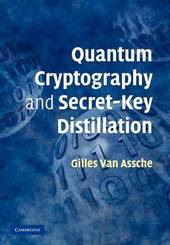
|
Quantum Cryptography and Secret-Key Distillation
Paperback / softback
Main Details
| Title |
Quantum Cryptography and Secret-Key Distillation
|
| Authors and Contributors |
By (author) Gilles van Assche
|
| Physical Properties |
| Format:Paperback / softback | | Pages:276 | | Dimensions(mm): Height 244,Width 170 |
|
| Category/Genre | Applied physics
Electrical engineering |
|---|
| ISBN/Barcode |
9781107410633
|
| Classifications | Dewey:005.82 |
|---|
| Audience | | Professional & Vocational | |
|---|
|
Publishing Details |
| Publisher |
Cambridge University Press
|
| Imprint |
Cambridge University Press
|
| Publication Date |
4 October 2012 |
| Publication Country |
United Kingdom
|
Description
Quantum cryptography (or quantum key distribution) is a state-of-the-art technique that exploits properties of quantum mechanics to guarantee the secure exchange of secret keys. This 2006 text introduces the principles and techniques of quantum cryptography, setting it in the wider context of cryptography and security, with specific focus on secret-key distillation. The book starts with an overview chapter, progressing to classical cryptography, information theory (classical and quantum), and applications of quantum cryptography. The discussion moves to secret-key distillation, privacy amplification and reconciliation techniques, concluding with the security principles of quantum cryptography. The author explains the physical implementation and security of these systems, enabling engineers to gauge the suitability of quantum cryptography for securing transmission in their particular application. With its blend of fundamental theory, implementation techniques, and details of recent protocols, this book will be of interest to graduate students, researchers, and practitioners in electrical engineering, physics, and computer science.
ReviewsReview of the hardback: 'This is a self-contained book, which is accessible to newcomers to the field with a basic background in physical and computer sciences, as well as electrical engineering. Being up-to-date, this book will, at the same time, prove useful to the scientists already involved in quantum cryptography research.' Zentralblatt MATH
|